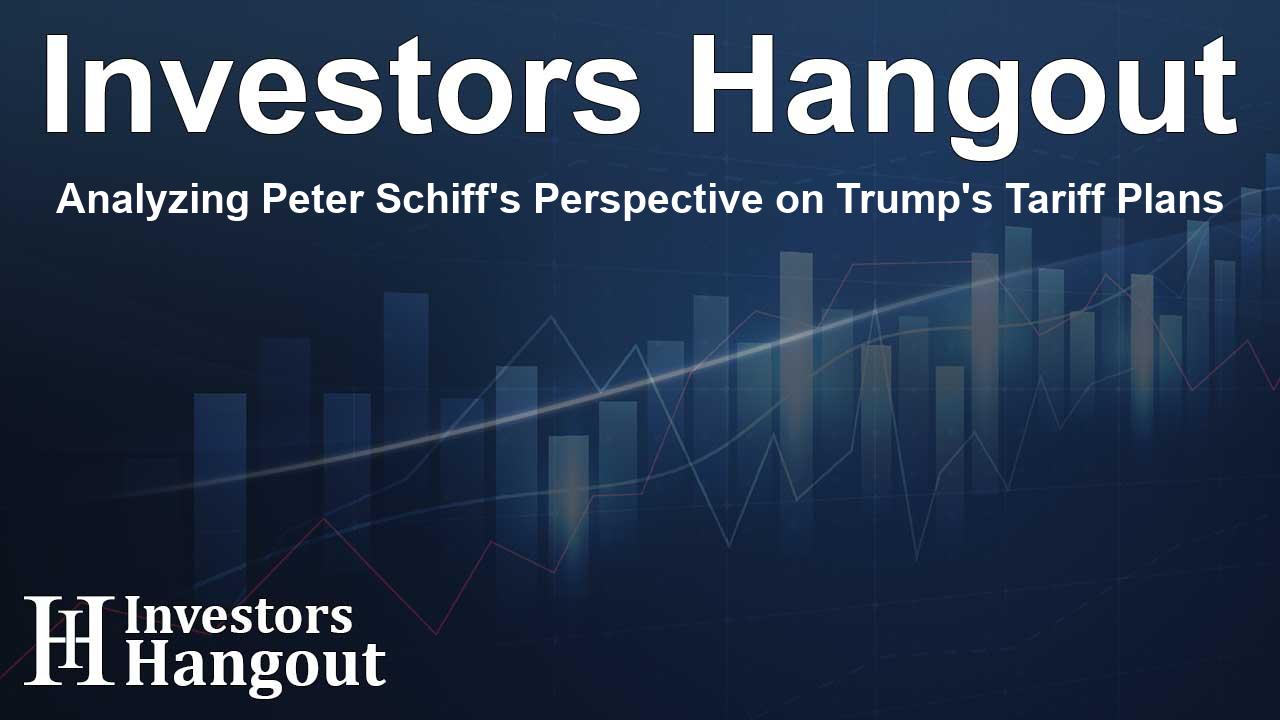Analyzing Peter Schiff's Perspective on Trump's Tariff Plans

Insightful Critique by Peter Schiff on Tariff Hikes
Recent threats by President Donald Trump to impose a substantial 30% tariff on imports from Mexico and the European Union have sparked considerable debate. Economist Peter Schiff has voiced his skepticism regarding these tariffs, emphasizing the underlying economic issues rather than just trade policies.
Understanding the Context of Tariff Threats
According to Schiff, Trump's justification for the proposed tariffs is to address trade deficits with these regions, which he sees as indicative of unfair economic practices. Schiff believes that these tariffs are not the silver bullet to fix what he describes as deeper structural problems in the U.S. economy.
Structural Issues Over Trade Disputes
Schiff argues that the trade deficits are not merely a result of unfavorable trade agreements but are symptoms of significant economic flaws, particularly excessive debt and consumer habits overshadowed by a lack of savings and investment. This perspective emphasizes a need for a more comprehensive solution rather than relying on tariffs alone.
The Role of Trade Deficits in Economic Policy
Schiff warns that the U.S. economy effectively relies on these trade deficits to manage its internal economic challenges. He cautions against the implications of implementing the 30% tariffs, which he believes could exacerbate existing issues and lead to increased inflation and elevated interest rates.
Potential Consequences of Trump's Tariff Strategy
Furthermore, Schiff argues that the push for such tariffs could lead to adverse economic effects. He asserts that substantial changes, such as a significant reduction in the U.S. Dollar's value or the imposition of severe tariffs, would be necessary to genuinely improve trade deficits. Without these drastic measures, Schiff contends that the tariffs would likely worsen the trade deficit.
Expert Opinions Aligning with Schiff
Prominent economic figures, including former Treasury Secretary Lawrence Summers, have echoed similar sentiments. Summers has previously suggested that engaging in favorable trading practices can benefit the U.S. economy by allowing consumers to purchase goods at lower prices.
The Debate on Fair Trade Practices
The discussion surrounding Trump's tariff threats brings to light broader questions regarding international trade practices. As various economists express differing views on trade fairness, the complexity of tariffs and their impact on everyday consumers continues to evolve.
Conclusion: A Cautious Outlook on Tariff Implications
In summary, Peter Schiff’s assessment provides a critical lens through which to view the proposed tariffs. By identifying the core economic issues plaguing the U.S., Schiff emphasizes the importance of addressing these concerns with effective solutions rather than relying solely on tariffs, which could lead to detrimental economic repercussions.
Frequently Asked Questions
What are Peter Schiff's main concerns regarding the tariffs?
Schiff believes tariffs do not address the deeper structural issues of excessive debt and low savings in the U.S. economy.
How does Schiff propose to handle trade deficits?
He suggests that significant changes, such as a decline in the U.S. Dollar or high tariffs, are needed to genuinely resolve trade deficits.
What is the potential impact of the proposed tariffs on inflation?
Schiff warns that implementing the tariffs could lead to increased inflation and higher interest rates.
Are there alternative views on Trump's trade policies?
Yes, some economists, like Lawrence Summers, argue that engaging in open trade helps keep prices low for consumers.
What is the broader economic implication of relying on trade deficits?
Schiff indicates that reliance on trade deficits may distract from solving fundamental economic issues, potentially prolonging economic instability.
About The Author
Contact Owen Jenkins privately here. Or send an email with ATTN: Owen Jenkins as the subject to contact@investorshangout.com.
About Investors Hangout
Investors Hangout is a leading online stock forum for financial discussion and learning, offering a wide range of free tools and resources. It draws in traders of all levels, who exchange market knowledge, investigate trading tactics, and keep an eye on industry developments in real time. Featuring financial articles, stock message boards, quotes, charts, company profiles, and live news updates. Through cooperative learning and a wealth of informational resources, it helps users from novices creating their first portfolios to experts honing their techniques. Join Investors Hangout today: https://investorshangout.com/
The content of this article is based on factual, publicly available information and does not represent legal, financial, or investment advice. Investors Hangout does not offer financial advice, and the author is not a licensed financial advisor. Consult a qualified advisor before making any financial or investment decisions based on this article. This article should not be considered advice to purchase, sell, or hold any securities or other investments. If any of the material provided here is inaccurate, please contact us for corrections.
